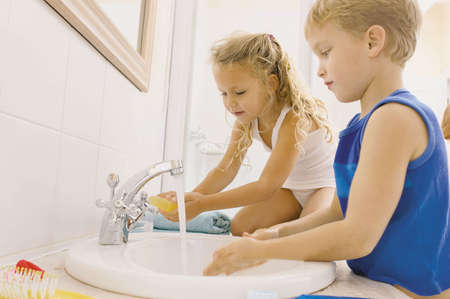
If there was one person who hates the water, more than my cat, he is my five year old nephew. Bath time for him to correspond to a match where there is a constant war raging of wills with my sister. He would be dirty and messy rather than bathing in the foam. When I looked at my sister chasing him around the house for a bath, I wondered about the importance of teaching children good hygiene habits. After all, children's health is not only keeping up appearances, it is important that children learn good hygiene habits to stay healthy and prevent disease from spreading. Here's a look at some lessons on hygiene of children. Learn more about children.
Child Hygiene: Bath time criticism: it's amazing how babies love to have fun in the water grow prepubertal children with a complete aversion disorder, even for a ten-minute shower. Apart from the need to establish a personal hygiene routine for children. You should wash your face, neck and lower part of children throughout the day. Older children should have a bath every day, especially in summer. For children who have reached puberty and face persistent problems of body odor in his arms and private parts, a daily shower is a necessity.
Child Hygiene: Wash your hands: Did you know that hand washing is the best way to prevent the spread of the disease? This is because the bacteria are infected can spread easily in your hand. However, it is necessary to teach children the best way to employ the correct hand washing techniques. Measures to correct hand washing are:
* First wet your hands thoroughly with warm water
* Use enough soap to create a good lather and rub hands vigorously for 20 seconds
Wash both the palms and backs of your hands to get rid of dirt stuck in your nails
* Wash hands and dry with a towel

Make sure children wash their hands before eating, after coming from outside or playing with animals. In cars and play areas when there is no access to running water, wet wipes and hand sanitizers are a good distance to keep hands clean. However, it is necessary to monitor the younger children who may end up putting their hands in their mouths or rub their eyes before evaporating disinfectant.
Child Care: Nail Care: Keep your nails trimmed and clean your child is essential to fight the bacteria that lurk in the disordered them. Scratching nails infected skin germs can cause skin infections and rashes.
Child Health: Dentistry: Pediatric dentists recommend that after the age of one, all children should be examined by dentists. This is because it is estimated that twenty percent of children aged three already been affected by tooth decay. Regular brushing is a vital part of the dental health of children. Pre-teens should ideally brushing three times a day to prevent bad breath and tooth decay. Children who have just received treatment sweet should brush within twenty minutes to avoid the risk of holes. It is important to teach children under ten to brush and floss correctly. If your child is sensitive to the use of cavity mouthwash fluoride to prevent tooth decay. Learn more about basic dental care.
Child Care: Hair Care: While most parents go through all the trouble of creating a skin cleansing routine that does not pay much attention to hair. But to wash your hair daily is just as important as swimming. Wash hair with shampoo, massage and rinse thoroughly with water. You can experiment with different shampoos to choose the best for your child. If your child has a hair problem, you can use medicated shampoo prescribed by your doctor.
Hygiene children change clothes and shoes: an important part of personal hygiene often forgotten children of clothes and shoes on a regular basis. Clothing and shoes, including dead skin cells and sweat can cause bad odors and smelly skin infections such as foot fungus.
Make a routine that facilitates the maintenance of good hygiene and teach children about hygiene is essential to keep your child clean and healthy in the long term. Root of these habits to your child when he or she is young, with reminders, positive reinforcement, and even by setting a good example yourself and your child is likely to inculcate these habits for life.




0 comments:
Post a Comment